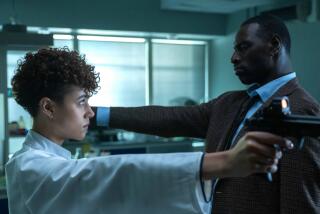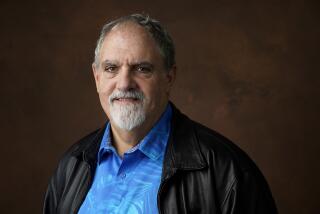John Travolta and Nicolas Cage get under each other’s skin--literally--in John Woo’s return to form, ‘Face/Off’
- Share via
John Woo is known for a cinema of violent delirium so breathtaking it plays like visual poetry, and “Face/Off,” though his third film in Hollywood, is the first to expose mainstream audiences to the master at his most anarchically persuasive.
But, as those who’ve seen the director’s cult favorite Hong Kong movies like “A Better Tomorrow,” “The Killer” and “Hard Boiled” can testify, Woo is also known for the sincerely sentimental underpinnings of his work. Bonding between men links all his films, which classically feature an emotional connection between the hero and the villain that’s the strongest one on screen.
Which is why, though it was written by the team of Mike Werb & Michael Colleary before either one had seen the Hong Kong films, “Face/Off” is a kind of ultimate John Woo movie. Its tale of identity-switching takes the director’s usual themes to their logical extreme, resulting in a delicious inside-out double-reverse movie that’s as outrageous and over the top as anyone could want.
For “Face/Off’s” title refers not only to the inevitable confrontation between good and bad but to a literal switching of physical identities as well. It’s a film that demands that its stars play two roles, one nestled inside the other like interlocking toy dolls, a task
been handled so persuasively by John Travolta and Nicolas Cage that they’ve inspired Woo to do his best work in years.
The director, who didn’t seem to be quite hitting his stride with his first two American films, “Hard Target” and “Broken Arrow,” here offers a demonstration of action as it should be done. In its best moments, “Face/Off” practically mainlines fury, leaving audiences no time to think or even breathe.
With an offbeat sense of humor, an eye for small visual touches and a weakness for white doves added to an intuitive grasp of the mechanics of large-scale pyrotechnics, Woo ensures that no one’s eyes will be leaving the screen when he’s spinning his apocalyptic web.
After a brief prologue set six years ago that establishes the reason for the enmity between Sean Archer (Travolta) and Castor Troy (Cage), “Face/Off” moves up to the present, with Archer as the driven, humorless leader of the usual supersecret government anti-terrorist team.
Archer’s main target is, no surprise, Castor Troy and his sniveling sociopath brother Pollux (Alessandro Nivola). Castor is no bargain either, establishing himself early on as a showy and bombastic homicidal maniac, a terrorist-for-hire whose huge gold-dipped handguns decorated with custom-made dragon grips are the least flashy thing about him.
Castor and Pollux get defanged in “Face/Off’s” initial action sequence, coming out on the short end of a tussle with Archer, an unhappy man who has let his relationships with wife Eve (Joan Allen) and pouty teenage daughter Jamie (Dominique Swain) deteriorate in his manic quest to nail his nemesis. “It’s over,” he tells Eve after the battle, but we know better.
It turns out that no one but Castor, who’s in one of those movie comas, and Pollux, who’s in prison, know exactly where the pair have planted a poison gas bomb that will decimate Los Angeles in just a few days. The only way to save the city is for Archer to assume Castor’s identity and worm the info out of the imprisoned Pollux.
We’re not talking a fake driver’s license here. Thanks to an experimental surgical procedure involving something called a “morpho-genetic template,” Archer, in a sequence that owes a lot to Georges Franju’s indelible “Eyes Without a Face,” manages to disappear behind Castor’s face and inside his body type. Everyone assures him it’s reversible but it’s still awfully creepy.
*
Creepier still is what happens when, for no apparent reason, Castor wakes up and, because it’s the only one not spoken for, ends up grabbing Archer’s face and body. So both men, each looking like his own worst enemy, try to complete the jobs they started when they looked like themselves.
“Face/Off’s” script is not strong on dialogue or conventional plausibility, but its themes are sound, and one of its more intriguing ones is how flummoxed Archer and Castor are by having to live the lives of their hated opponents. Imprisonment and dissipation in no way agree with Archer, and Castor, despite sharing a bed with Archer’s wife and leering at his daughter, finds married life is more complex and onerous than he anticipated.
Cage and Travolta are equally successful with their double-barreled roles, and in fact both do better playing the self-loathing that comes with being a frustrated personality in an unwanted body. Travolta, when in the grip of Castor’s persona, even gets to make some disparaging comments about his own chin. It’s that kind of movie.
It’s safe to say that Joan Allen, not usually found in films of this sort, will not get a third Oscar nomination for her work as Archer’s sorely tried wife, but it’s precisely her skill at making her character both grounded and believable that is essential in giving “Face/Off” what reality it has.
Not surprisingly, it’s John Woo, able to provide a nautical sequence that shames “Speed 2” plus carnage choreographed to Olivia Newton-John singing “Somewhere Over the Rainbow,” who is the real star of “Face/Off.” It’s difficult to describe the jolt his films deliver when he’s on, and he is on with a vengeance here.
* MPAA rating: R, for intense sequences of strong violence, and for strong language. Times guidelines: glimpses of a man without a face.
(BEGIN TEXT OF INFOBOX / INFOGRAPHIC)
‘Face/Off’
John Travolta: Sean Archer
Nicolas Cage: Castor Troy
Joan Allen: Eve Archer
Gina Gershon: Sasha Hassler
Alessandro Nivola: Pollux Troy
Dominique Swain: Jamie Archer
A Douglas/Reuther, WCC Entertainment, David Permut production, released by Paramount Pictures. Director John Woo. Producers David Permut, Barrie Osborne, Terence Chang, Christopher Godsick. Executive producers Michael Douglas, Steven Reuther, Jonathan D. Krane. Screenplay Mike Werb & Michael Colleary. Cinematographer Oliver Wood. Editor Christian Adam Wagner. Costumes Ellen Mirojnick. Music John Powell. Production design Neil Spisak. Art director Steve Arnold. Set decorator Garrett Lewis. Running time: 2 hours, 18 minutes.
* In general release throughout Southern California.
More to Read
Only good movies
Get the Indie Focus newsletter, Mark Olsen's weekly guide to the world of cinema.
You may occasionally receive promotional content from the Los Angeles Times.











